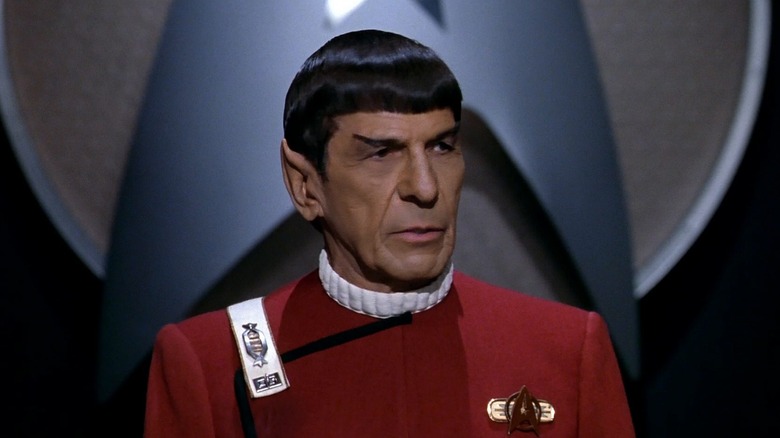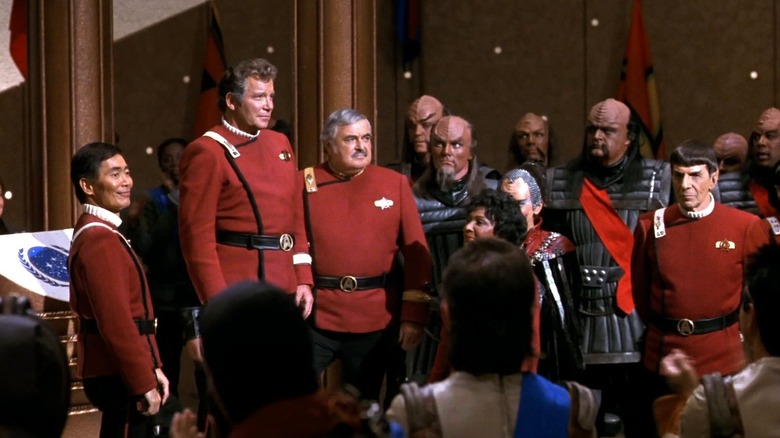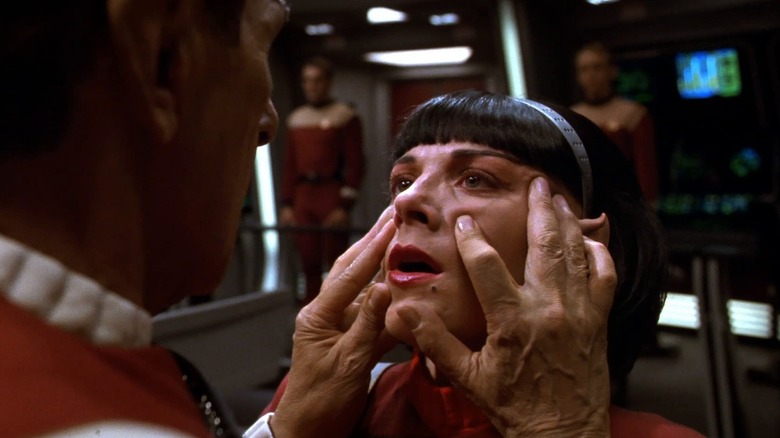Star Trek VI's Director Has A Major Regret About A Spock Moment
Nicholas Meyer's film "Star Trek VI: The Undiscovered Country" — released on December 6, 1991 — serves as a pretty clear metaphor for the politics of the time. At the beginning of the film, an entire Klingon moon, Praxis, is obliterated by a horrendous mining disaster. The Klingon Empire was in such desperate straits already, that this disaster risks toppling the entire government. The only way to save the Klingon Empire is to end its decades long Cold War with the Federation, and reach out as a potential ally. This, of course, was all a rather direct symbol for the fall of the Berlin Wall in 1989. It was also, in a stroke of lucky timing, a symbol for the subsequent collapse of the Soviet Union, which had only taken place the previous August. It was prescient of the "Star Trek VI" screenwriters to essentially predict the fall of the Soviet Union, as the script was being written shortly before it actually happened.
When the Soviet Union fell, a decades-long Cold War with the United States ended, and it seemed — at least for a short, optimistic period — that Russia would become one of America's allies. There was a lot to hope for in the late months of 1991, and that optimism was reflected in "Star Trek VI," a movie that posited that the Federation and the Klingon Empire would indeed become allies after signing a peace accord. It was only old-world warmongers — soldiers who couldn't stand the thought of stopping battle efforts — who tried to halt the peace talks and perpetuate the Cold War. The film's finale saw the warmongers defeated.
Also, back in 2016, Meyer spoke with IGN, and he admitted that "Star Trek VI" was not only naive in this regard, but that Spock (Leonard Nimoy) hs a moment of express cruelty that he wishes he could take back. Forcing a mind-meld on Valeris (Kim Cattrall), Meyer said, was way harsher than something Spock should have done.
Firstly, Star Trek VI was naive about politics
As mentioned, "Star Trek VI" ends with a brave new world for the Federation. Klingons had classically been "the bad guys" throughout "Star Trek" history, so turning them into allies was seen as a dramatic step forward for the franchise. Of course, rosier relationships with the Klingons had already been dramatized in "Star Trek: The Next Generation," which is set nearly a century beyond the events of "Star Trek VI," so Trekkies knew it was coming.
Meyer merely got to tell the story of how that relationship began. He also acknowledged, however, that his optimistic view of the Klingons — definitely a parallel to the U.S.S.R. — ended up being far more fraught in real life. As he put it:
"The naïveté doesn't exactly make me wince, but there are things that make me wince in it. The naive thing I suppose is simply that we thought, in the words of Francis Fukuyama, that we had reached the end of history and we were entering a brave new world minus the Soviet Union where everything was going to be peaches and cream. And, in fact, we've entered a world which is arguably much more dangerous than [being] eyeball to eyeball with the USSR. And in that sense, yes, we were naive. We were extremely prescient in that we predicted the Soviet coup before it happened."
It should be noted that Meyer made these statements in late November of 2016, right after Donald Trump had been elected president (the first time), and scandals about Russian interference in the U.S. election were plentiful. Meyer, as much as anyone, could see that his views of Russian allies in 1991 weren't as complex as they could have been.
Secondly, Spock should never have forced a mind-meld on Valeris
Meyer's greater regret of "Star Trek VI," however, involves a moment involving Spock. Near the end of the movie it is revealed that Spock's young protégé, a Vulcan named Valeris, has had something to do with an assassination, a cover-up, and a conspiracy to keep the Cold War going. The details are very complex, and I would not spoil them here. Spock, however, does find out about Valeris' involvement, and presses her for information. When she obfuscates, Spock forcibly performs a mind meld on her, in order to delve into her brain and read her thoughts. Valeris is very protective, and also doesn't know all the details Spock wants, so the mind-meld scene gets very intense. Valeris, by the end, looks like she's in immense pain.
Rewatching the scene in 2016, Meyer felt that it looks like Spock was essentially torturing Valeris to get information out of her. That, the director felt, was unseemly.
"I also think that the scene where Spock is doing the Vulcan mind meld on Valeris to get information sort of looks like waterboarding to me, and doesn't make me very happy to see it. [...] It doesn't seem like the right thing."
When asked if any of the filmmakers felt the mind-meld scene was a torture scene in 1991, Meyer admitted that no one had considered that. Spock, a logical and peaceful character, wouldn't have resorted to torture. Perhaps if Kim Cattrall had been directed to look like she wasn't so much in pain, the curse would have been taken off the scene, but she gasps and gurgles as if her brain is on fire. It's pretty harsh in retrospect. It's no wonder Meyer kind of regrets it.


